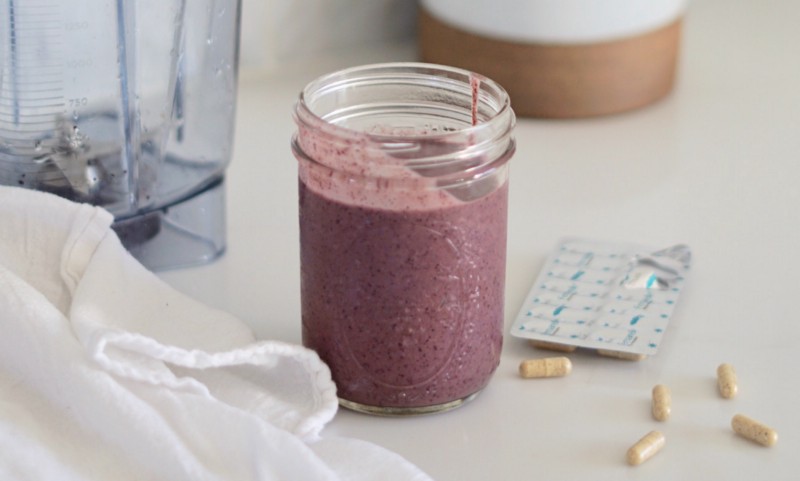
We created our Plant-Based Probiotic Smoothie to boost your gut health. But what are probiotics? Why do we need them? Registered dietitian, Eliza Savage, explains all.
What are probiotics?
Probiotics are good bacteria that live in your gut. They’re key for nutrient absorption and immune system support. “Pro” + “biota” = “for life”.
Where do we find them?
Probiotics are found in many foods, including fermented vegetables e.g. sauerkraut and kimchi, kefir (a fermented milk drink), yogurt, kombucha, tempeh and natto (fermented soybeans), apple cider vinegar, and miso.
Probiotics can also be taken as supplements. There are quite a few types.
What’s the difference between prebiotics and probiotics?
Probiotics are the good bacteria. Prebiotics are the food for this good bacteria.
Prebiotics are a type of non-digestive fiber [Fibers that absorb water as you digest them, and don’t significantly impact your metabolism. — Ed.]. You find them in foods like garlic, sunchokes, jicama, dandelion greens, leeks, asparagus, and onions.
Pair prebiotics and probiotics, and experience even better gut health and wellbeing.
Why do we need probiotics?
A lack of probiotics can lead to skin issues, digestive distress, frequent sickness, and even autoimmune diseases.
Historically, we consumed fresh foods grown in healthy soil, and instead of refrigeration, we used fermentation to preserve the food. Today, much of our food supply is refrigerated and treated with antibiotics or chemicals to kill harmful bacteria. No surprise that this treatment kills off the good bacteria as well. Modern advances in medicine, like antibiotics, can be lifesaving and critical, but can leave our gut microbiome (the beneficial bacteria) depleted.
That all means we need to focus on eating organic, natural sources of probiotics, and use supplements when needed.
What symptoms show we need to boost our probiotic intake?
I would recommend that everyone incorporate probiotic-rich foods into their diet! A healthy gut means a healthy body and mind!
Specifically, if you ever suffer from bloating, skin trouble, diarrhea or constipation, or have an autoimmune issue, you may want to use a supplement as well. I’m fascinated by the research coming out about the relationship between gut health and mental health. Probiotics may even boost your mood!
Personally, I take one probiotic supplement daily. I would always recommend a probiotic supplement if you’re taking antibiotics for an infection. Pregnant ladies, speak with your physician before starting a probiotic.
There’s so many different types! Which one do I need?
It’s challenging to pick a product with so many different types available. Different strains of beneficial bacteria affect the body in different ways, so I would encourage you to try one, and then rotate to a different type once you’re finished. Supplements, including probiotics, are not regulated by the FDA, so choose a brand that you trust or that’s been recommended by a medical professional. Vegan probiotics — such as the GanedenBC30 in the new Splendid Spoon Plant-Based Probiotic Smoothie — are a good choice (and delicious)!
Probiotic supplements (in pill or liquid form) deliver the good bacteria straight to the digestive tract, and work in a variety of ways to promote and maintain a healthy microbiome.
